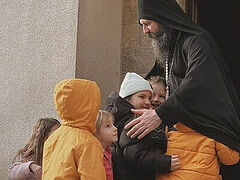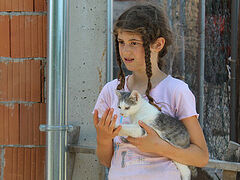 Marta Dasic, a student from Kosovo and Metohija Millions have become refugees: scattered all over the world, they try to find a place they could call home some day—yet, it doesn’t work. There is no such place except the only one that you abandoned or, rather, was forced to leave. This is the sad fate of generations of Kosovo Serbs who fled away from their land. The sufferings, the search of a new home, the humiliation of being an émigré or a refugee, feeling like a stranger anywhere you go, attempts to return no matter what—any Serbian family could share a similar story. In keeping with the Christian conviction that there is no such thing as destiny or fate, but only Divine Providence for man, the Dasic family returned to their native village of Brestovik, near the town of Pec and not far from the monastery of the Patriarchate of Pec. They returned, despite the post-war devastation, almost literally to the smoldering ruins of their native home. When Marta Dasic grew older, in emulation of her parents she became a student of the Philological Department at the University of Pristina, where she studied the theory and history of literature.
Marta Dasic, a student from Kosovo and Metohija Millions have become refugees: scattered all over the world, they try to find a place they could call home some day—yet, it doesn’t work. There is no such place except the only one that you abandoned or, rather, was forced to leave. This is the sad fate of generations of Kosovo Serbs who fled away from their land. The sufferings, the search of a new home, the humiliation of being an émigré or a refugee, feeling like a stranger anywhere you go, attempts to return no matter what—any Serbian family could share a similar story. In keeping with the Christian conviction that there is no such thing as destiny or fate, but only Divine Providence for man, the Dasic family returned to their native village of Brestovik, near the town of Pec and not far from the monastery of the Patriarchate of Pec. They returned, despite the post-war devastation, almost literally to the smoldering ruins of their native home. When Marta Dasic grew older, in emulation of her parents she became a student of the Philological Department at the University of Pristina, where she studied the theory and history of literature.
My mother and father were doing everything they could so that we wouldn’t feel that we practically lived under occupation
“My family fled Kosovo in 1999, during the war and terror. We lived in central Serbia and this is where I was born. Even though it was Serbia, we felt as if everything around was foreign to us—living in a rented apartment and knowing that you don't really own anything here is no picnic. At the same time, your own house built by your ancestors and your land, where generations of forefathers labored, was laid waste. Being homesick—well, I was born with this feeling. Ever since we were small, every time we heard our parents' stories about their native Kosovo, we dreamed of going home. Sure, we were afraid; it is not all so simple to return to a place where there is impending danger, especially when you have two young children. But I am glad that we returned. Thank God.
 Glory to God we returned while we were still young. Childhood doesn’t allow you to look at the world with suspicion—children prefer a bright and joyful outlook. So, as we were growing up, we lived in our Brestovik and always wondered why our mother and father were afraid to return here, since we spent our time playing, dreaming, and rejoicing at the newfound beauty of our native places.
Glory to God we returned while we were still young. Childhood doesn’t allow you to look at the world with suspicion—children prefer a bright and joyful outlook. So, as we were growing up, we lived in our Brestovik and always wondered why our mother and father were afraid to return here, since we spent our time playing, dreaming, and rejoicing at the newfound beauty of our native places.
So what if we didn’t have things that other parents typically spoil their children with! So what if we didn't have any big-city entertainment, or God knows what else, like in Belgrade! But you can’t find such beauty anywhere else! Such beauty plus tranquility—my mother and father did everything possible so that we would never feel that we were practically living under occupation. A feeling of being at home, a sense of our native home—that’s what they gave us.
Why did I all of sudden decide to study Serbian language and literature at a time when the majority of young people choose other fields of study that offer more opportunities to get a well-paid job? Who needs those boring linguists with their books and letters?
 In the classroom I like the language and I like Slavic literature. After all, the life of a nation isn’t exclusively about diagrams displaying population’s increase in purchasing power. I firmly believe that language and literature help a nation not to turn into a populace—and it is arch-important for Serbia, and Kosovo and Metohija, too! So I don’t regret in the least bit that I chose philology.
In the classroom I like the language and I like Slavic literature. After all, the life of a nation isn’t exclusively about diagrams displaying population’s increase in purchasing power. I firmly believe that language and literature help a nation not to turn into a populace—and it is arch-important for Serbia, and Kosovo and Metohija, too! So I don’t regret in the least bit that I chose philology.
Despite all the difficulties, I want to stay here in my native area. Sure, I know perfectly well that you can’t find a job try as you might—and our young people take off running anyplace to avoid staying in Kosovo. Actually, this applies not only to Serbs, but also to Albanians. On the other hand, if all the Serbs flee, all that will be left for us would be to suffer phantom-limb pains in a strange land about our lost homeland—so, no thanks, I am staying put here. God willing, it will all work out here.”
***
We try to offer help to the best of our abilities to people like Marta who are confident that God will provide for them. This conviction gives strength to other people as well: like the ones who think of Kosovo and Metohija as not simply a stretch of land “somewhere out there, in Serbia,” but a land that’s native in spirit. Even if they have never been there.




